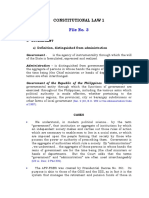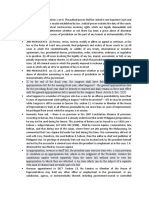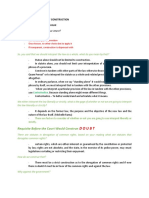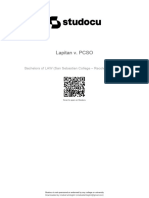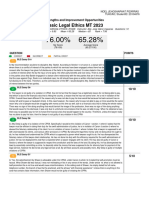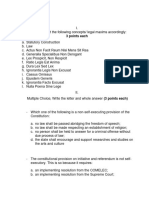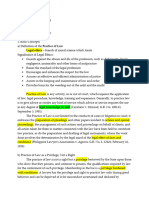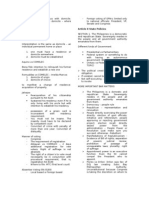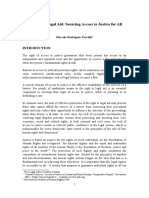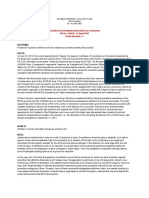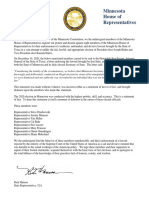Summary of Doctrines
Summary of Doctrines
Uploaded by
frank japosCopyright:
Available Formats
Summary of Doctrines
Summary of Doctrines
Uploaded by
frank japosOriginal Description:
Copyright
Available Formats
Share this document
Did you find this document useful?
Is this content inappropriate?
Copyright:
Available Formats
Summary of Doctrines
Summary of Doctrines
Uploaded by
frank japosCopyright:
Available Formats
SUMMARY OF DOCTRINES
CONSTITUTIONAL LAW 1
CONSTITUTION OF THE PHILIPPINES
De Leon v. ESGUERRA
T h e 1 9 8 7 C o n s t i t u t i o n w a s r a t i f i e d i n a p l e b i s c i t e o n F e b r u a r y 2 , 1 9 8 7 . B y t h a t d a t e , therefore, the
Provisional Constitution must be deemed to have been superseded. (Effectivity is immediately upon ratification)
Gonzales v. COMELEC
Nature of power to amend the Constitution or to propose amendments thereto: not inherent power of Congress but of the people; constituent
power of Congress
Tolentino v. COMELEC
The condition and limitation that all the amendments to be proposed by the same convention must be submitted in a single election or
plebiscite.
Imbong v. COMELEC
Competence of Congress acting as Constituent Assembly: Authority to call constitutional convention as Constituent Assembly
in enacting implementing details.
Sanidad v. COMELEC
-Presidential exercise of legislative powers (and proposing amendments) is valid in martial law.-Amending process is a
sovereign act, although the authority to institute the same and the procedure to be followed reside somehow in a particular body
(Pres. Marcos).
Santiago v. COMELEC
The right of the people to directly propose amendments to the Constitution through the system of initiative would
remain entombed in a cold niche until Congress provides for its implementation. Section 2 of Article XVII is not self-executing.
Lambino v. COMELEC
Essence of people's initiative: (1) people must author; (2) they must sign the proposal; (3) proposal is embodied in petition
CONCEPT OF STATE
Bacani vs NACOCO
The mere fact that the Government happens to be a major stockholder of a corporation does
not make it a public corporation.
Distinction between constituent and ministrant functions.
PVTA vs CIR
Distinction between constituent and ministrant functions obsolete.
Government has to provide for general welfare.
Gov. of the Phil. Islands vs. Monte de Piedad
Doctrine of Parens Patriae (state as guardian of the people)
Transfer of sovereignty; effect on laws:- abrogation of laws in conflict with the political character of the substituted sovereign(political law).-
great body of municipal law regarding private and domestic rights continue in force until abrogated or changed by new ruler.
Co Kim Chan vs. Valdez Tan Keh
Continuity of Law: Law, once established, continues until changed by some competent legislative power (not changed by mere change of
sovereignty)
All acts and proceedings of the 3 gov. depts. of a de facto government are good and valid.
Kinds of De facto government:(1) de facto proper government obtained by force or voice of the majority(2) paramount force by military
forces who invade the territory(3) independent government established by inhabitants through insurrection
Republic of the Philippines (during Japanese occupation) was a de facto government.
People vs Gozo
Principle of Auto-limitation:
Extent of Philippine sovereignty over American bases Philippine Government has not abdicated its sovereignty over the bases as part of the
Philippine territory.
Laurel vs Misa
Nature of Allegiance to sovereign: Absolute and permanent
Effect of enemy occupation: sovereignty of the government not transferred to occupier
Ruffy v Chief of Staff
The rule that laws of political nature or affecting political relations are considered superseded or held in abeyance during the military
occupation, is intended for the governing of the civil inhabitants of the occupied territory and not for the enemies in arms.
STATE IMMUNITY
Sanders v Veridiano
Mere allegation that a government functionary is being sued in his personal capacity will not automatically remove him from the protection of
the laws of public officers and doctrine of state immunity
Doctrine of state immunity applicable also to other states.
Republic v Sandoval
State cannot be held liable for the deaths that followed the incident; liability should fall on the public officers who committed acts beyond their
authority
3 instances when suit is proper: 1. when sued by its name 2. When unincorporated government agency is sued 3. When the suit is against a
government employee but liability belongs to the government
Festejo v Fernando
Officer or employee committing the tort is personally liable and maybe sued as any other citizen and held answerable for whatever injury
USA vs Guinto
-A state may be said to have descended to the level of an individual and can thus be deemed to have tacitly given its consent to be sued only
when it enters into business contracts.
Veterans Manpower vs CA
-The state is deemed to have given tacitly its consent to be sued when it enters into a contract. However, it does not apply where the contract
relates to the exercise of its sovereign functions.
The Merritt vs Govt of the Phil
-By consenting to be sued, a state simply waives its immunity from suit. It does not thereby concede its liability to the plaintiff, or create any
cause of action in his favor, or extend its liability to any cause not previously recognized. It merely gives remedy to enforce a pre-existing liability
and submit itself to the jurisdiction of the court, subject to its right to interpose any lawful defense.
Amigable vs. Cuenca
The government, when it takes away a property from a private land owner for public use without going through the legal process of
expropriation or negotiated sale, the aggrieved party may properly maintain a suit against the government without thereby violating the doctrine
of governmental immunity from suit. This doctrine cannot be used in perpetrating injustice to a citizen.
You might also like
- Brunette Criminal ComplaintDocument33 pagesBrunette Criminal ComplaintFOX 11 NewsNo ratings yet
- CONSTITUTIONAL LAW I State and Its Elements NotesDocument3 pagesCONSTITUTIONAL LAW I State and Its Elements NotesEm DraperNo ratings yet
- Environmental Law-With EditDocument190 pagesEnvironmental Law-With Editfrank japos100% (2)
- DBQ - Views On Territorial Expansion 1800-1855Document2 pagesDBQ - Views On Territorial Expansion 1800-1855Anonymous typRM8RL100% (2)
- Final Coaching SociologyDocument73 pagesFinal Coaching SociologyAiram Tano83% (12)
- HDMF (Pag-Ibig Fund) - Special Power of AttorneyDocument2 pagesHDMF (Pag-Ibig Fund) - Special Power of AttorneyTierra Verde0% (1)
- 2 Republic V Judge of CFI of Rizal G.R. No. L-35919Document3 pages2 Republic V Judge of CFI of Rizal G.R. No. L-35919SDN HelplineNo ratings yet
- Philo Q&A (Philosophy of Law)Document6 pagesPhilo Q&A (Philosophy of Law)libralanxaustralisNo ratings yet
- Doctrines Consti 1 1Document7 pagesDoctrines Consti 1 1Aldrin Karl SeguradaNo ratings yet
- Microsoft Word - MyReviewer Notes CRIMINAL 2 - RunningDocument53 pagesMicrosoft Word - MyReviewer Notes CRIMINAL 2 - RunningMRBNo ratings yet
- Constitutional Law 1: File No. 3Document31 pagesConstitutional Law 1: File No. 3Rey ObiasNo ratings yet
- Constitutional LawDocument99 pagesConstitutional LawRommel BalandraNo ratings yet
- Constilaw ReviewerDocument138 pagesConstilaw ReviewerAllicia LeyvaNo ratings yet
- Francisco Vs House of RepresentativesDocument5 pagesFrancisco Vs House of RepresentativesCelest AtasNo ratings yet
- 3 Branches of GovtDocument25 pages3 Branches of GovtDona NofiesNo ratings yet
- Crim Pro - Rule 117 Motion To QuashDocument6 pagesCrim Pro - Rule 117 Motion To QuashAU SLNo ratings yet
- Consti Reviewer NotesDocument5 pagesConsti Reviewer NotesArvhie SantosNo ratings yet
- How Are Felonies CommittedDocument4 pagesHow Are Felonies CommittedErnuel PestanoNo ratings yet
- Consti QuestionsDocument2 pagesConsti QuestionsJonas Paul MacabangunNo ratings yet
- How Do You Ascertain Legislative Intent?Document7 pagesHow Do You Ascertain Legislative Intent?AlrezaJanNo ratings yet
- Landbank V CA 1996 (Agrarian Law)Document4 pagesLandbank V CA 1996 (Agrarian Law)Rynor Selyob SomarNo ratings yet
- Obligations: I. General ProvisionsDocument5 pagesObligations: I. General ProvisionsNotario PrivadoNo ratings yet
- A.M. No. 17-08-01-SC STATCONDocument21 pagesA.M. No. 17-08-01-SC STATCONFrench TemplonuevoNo ratings yet
- Xavier Ateneo Law Academic PoliciesDocument16 pagesXavier Ateneo Law Academic PoliciesIan ChristianNo ratings yet
- Indeterminate Sentence LawDocument4 pagesIndeterminate Sentence LawMark Gregory SalayaNo ratings yet
- People Vs RafonDocument10 pagesPeople Vs RafonAudrey Kristina MaypaNo ratings yet
- Consti 1 Midterm Exam (13 14 17 18)Document2 pagesConsti 1 Midterm Exam (13 14 17 18)prince pacasumNo ratings yet
- Lapitan V PcsoDocument7 pagesLapitan V PcsonineballwhiteglintNo ratings yet
- 1 Legal Ethics ExamDocument1 page1 Legal Ethics ExamlhemnavalNo ratings yet
- Consti ReviewerDocument10 pagesConsti Reviewer723114bellaNo ratings yet
- Philosophy of Law Discussion Part 2Document8 pagesPhilosophy of Law Discussion Part 2Ron Uy PasionNo ratings yet
- Philippine Judge Vs PRADODocument3 pagesPhilippine Judge Vs PRADOJhay CarbonelNo ratings yet
- 3 CrimPro PDFDocument59 pages3 CrimPro PDFBob LawNo ratings yet
- Kupdfnet Reviewer in Obligations and ContractsDocument14 pagesKupdfnet Reviewer in Obligations and ContractsJoice BobosNo ratings yet
- 2016 BarDocument7 pages2016 BarJames CENo ratings yet
- Study Law The SMART WayDocument19 pagesStudy Law The SMART Waycliffdm20No ratings yet
- De Castro V JBCDocument24 pagesDe Castro V JBCEgay EvangelistaNo ratings yet
- Exam Taker Answer ReportDocument2 pagesExam Taker Answer ReportNoel Jehoshaphat TunacaoNo ratings yet
- Executive DepartmentDocument9 pagesExecutive DepartmentLeslie S. AndresNo ratings yet
- (G.R. No. 232678, July 03, 2019) Donato Reyes VawcDocument12 pages(G.R. No. 232678, July 03, 2019) Donato Reyes VawcFlorenz Efren CacatianNo ratings yet
- Stat Con Vera vs. Avelino (Aug 31 1946 Bengzon, J.)Document6 pagesStat Con Vera vs. Avelino (Aug 31 1946 Bengzon, J.)Justine M.No ratings yet
- Criminal Law 1 Maria Gameng PDFDocument51 pagesCriminal Law 1 Maria Gameng PDFAnne DerramasNo ratings yet
- Persons and Family Relations Digested CasesDocument32 pagesPersons and Family Relations Digested CasesAllen SoNo ratings yet
- Statcon QuestionsDocument5 pagesStatcon QuestionsRhomar Lorenz EncantoNo ratings yet
- Basic Legal Ethics Notes 1Document12 pagesBasic Legal Ethics Notes 119102087No ratings yet
- Article Vii: Executive Department: Philippine ConstitutionDocument4 pagesArticle Vii: Executive Department: Philippine ConstitutionAl VincentNo ratings yet
- Consti Quiz 3Document7 pagesConsti Quiz 3Angelo BasaNo ratings yet
- Notes On BigamyDocument3 pagesNotes On Bigamyvalium420No ratings yet
- Introduction To Legal PositivismDocument16 pagesIntroduction To Legal PositivismReni SunartyNo ratings yet
- Case1 Tañada & Macapagal vs. Cuenco Et. AlDocument6 pagesCase1 Tañada & Macapagal vs. Cuenco Et. AlArchie CarlosNo ratings yet
- de Venecia JR., v. Sandiganbayan, G.R. No. 130240, February 5, 2002Document3 pagesde Venecia JR., v. Sandiganbayan, G.R. No. 130240, February 5, 2002Madara UchihaNo ratings yet
- Final Examination - Basic Legal and Judicial EthicsDocument8 pagesFinal Examination - Basic Legal and Judicial EthicsCecille DiazNo ratings yet
- New Civil CodeDocument6 pagesNew Civil CodeThea PorrasNo ratings yet
- Indeterminate Sentence LawDocument5 pagesIndeterminate Sentence LawLablee CatzNo ratings yet
- Abbas v. Senate Electoral Tribunal, 164 Scra 651Document3 pagesAbbas v. Senate Electoral Tribunal, 164 Scra 651Agnes FranciscoNo ratings yet
- Constitutional Law I: Judicial Elaboration of The ConstitutionDocument11 pagesConstitutional Law I: Judicial Elaboration of The ConstitutionGary EgayNo ratings yet
- Iii. Cardinal Rules of Construction: How To Ascertain Legislative Intent?Document8 pagesIii. Cardinal Rules of Construction: How To Ascertain Legislative Intent?The Money FAQsNo ratings yet
- CONSTI CasesDocument41 pagesCONSTI CasesMaria Diory Rabajante100% (11)
- Political LawDOCTRINESDocument20 pagesPolitical LawDOCTRINESDennis SalemNo ratings yet
- CONSTI Cases and DoctrinesDocument41 pagesCONSTI Cases and DoctrinesAli BastiNo ratings yet
- Consti Finals Reviewer XDocument5 pagesConsti Finals Reviewer XChaoSisonNo ratings yet
- RevUp Consti 1 PDFDocument54 pagesRevUp Consti 1 PDFRexenne MarieNo ratings yet
- DOCTRINES Consti1 Cases (Based On Atty. Gabriel's Outline)Document33 pagesDOCTRINES Consti1 Cases (Based On Atty. Gabriel's Outline)Jane Kathyrine Lim-MarquezNo ratings yet
- Political Law-June 29Document4 pagesPolitical Law-June 29Cameron RamosNo ratings yet
- Exam Questions Consti 1Document10 pagesExam Questions Consti 1TheodoreJosephJumamil100% (1)
- A Modest ProposalDocument5 pagesA Modest Proposalfrank japosNo ratings yet
- Gregorio Sarasola V TrinidadDocument7 pagesGregorio Sarasola V Trinidadfrank japosNo ratings yet
- Sixteenth Congress of The) Republic of The Philippines) : First Regular SessionDocument4 pagesSixteenth Congress of The) Republic of The Philippines) : First Regular Sessionfrank japosNo ratings yet
- Introduction To Reasoning: K. P. Mohanan and Tara MohananDocument19 pagesIntroduction To Reasoning: K. P. Mohanan and Tara Mohananfrank japosNo ratings yet
- Raphael, School of AthensDocument12 pagesRaphael, School of Athensfrank japosNo ratings yet
- Sarra, Melgen J: - Bachelor of Law - 1 XU Law SchoolDocument1 pageSarra, Melgen J: - Bachelor of Law - 1 XU Law Schoolfrank japosNo ratings yet
- The Benefits of Household WasteDocument2 pagesThe Benefits of Household Wastefrank japosNo ratings yet
- Doctrine of Exhaustion of Administrative RemediesDocument1 pageDoctrine of Exhaustion of Administrative Remediesfrank japosNo ratings yet
- 003 Del Monte Fresh Produce V DOW ChemicalDocument2 pages003 Del Monte Fresh Produce V DOW Chemicalfrank japosNo ratings yet
- Informatory Petition - BajajDocument6 pagesInformatory Petition - BajajShreyaNo ratings yet
- Chapter Vi: Rights of Stockholders and MembersDocument7 pagesChapter Vi: Rights of Stockholders and MembersAlvin Aparijado EmolagaNo ratings yet
- Atty. Judy Anne Yuki Yulo, RN, MDDocument11 pagesAtty. Judy Anne Yuki Yulo, RN, MDUser 010897020197No ratings yet
- Election Law Review: Professor of Laws and Political Law Bar Reviewer Ateneo Law SchoolDocument46 pagesElection Law Review: Professor of Laws and Political Law Bar Reviewer Ateneo Law SchoolJean TubacNo ratings yet
- Marcela Rodriguez-Farrelly-EngDocument33 pagesMarcela Rodriguez-Farrelly-EngВікторія ПроданNo ratings yet
- 32 CONSULAR AREA RESIDENTS ASSOCIATION v. CASSANOVADocument2 pages32 CONSULAR AREA RESIDENTS ASSOCIATION v. CASSANOVAJerome LeañoNo ratings yet
- 47 U.S. Code 230 - Protection For Private Blocking and Screening of Offensive Material - U.S. Code - US Law - LII - Legal Information InstituteDocument7 pages47 U.S. Code 230 - Protection For Private Blocking and Screening of Offensive Material - U.S. Code - US Law - LII - Legal Information InstituteAlyanna ApacibleNo ratings yet
- Interim Order in Respect of Nirmal Infrahome Corporation LTDDocument24 pagesInterim Order in Respect of Nirmal Infrahome Corporation LTDShyam SunderNo ratings yet
- 9th SemDocument90 pages9th SemVamsi MajjiNo ratings yet
- Exempting Circumstance Case DigestsDocument23 pagesExempting Circumstance Case DigestsKaren Faye TorrecampoNo ratings yet
- CE 138 Activity 1.2 Code of Standard of Practicing Civil Engineers in Pagadian City and Zamboanga Del SurDocument5 pagesCE 138 Activity 1.2 Code of Standard of Practicing Civil Engineers in Pagadian City and Zamboanga Del SurAnthony jesusNo ratings yet
- Maryland v. Wirtz, 392 U.S. 183 (1968)Document17 pagesMaryland v. Wirtz, 392 U.S. 183 (1968)Scribd Government DocsNo ratings yet
- Cases On Unlawful SurveillanceDocument3 pagesCases On Unlawful Surveillanceifmiranda2211No ratings yet
- Dot Point 3 SorDocument16 pagesDot Point 3 Sorapi-247725573No ratings yet
- ACLU Taylor Demand LetterDocument19 pagesACLU Taylor Demand LetterHonolulu Star-AdvertiserNo ratings yet
- Contents of Tender Document: Sections Page NumberDocument25 pagesContents of Tender Document: Sections Page NumberAnand RacerNo ratings yet
- 001 - 130830 - COMPLAINT - FH Case 2 (Case 13-cv-61881-RNS)Document35 pages001 - 130830 - COMPLAINT - FH Case 2 (Case 13-cv-61881-RNS)Vikas GuptaNo ratings yet
- Minnesota House of RepresentativesDocument3 pagesMinnesota House of RepresentativesSally Jo SorensenNo ratings yet
- Constitution and Bi-Laws of ZPO RevisedDocument12 pagesConstitution and Bi-Laws of ZPO RevisedJack N GoNo ratings yet
- Rp. vs. HerbiertoDocument1 pageRp. vs. HerbiertoDarth JunusNo ratings yet
- Bar Q and A PartnershipDocument3 pagesBar Q and A PartnershipYvonne Dolorosa100% (1)
- The Gazette of IndiaDocument11 pagesThe Gazette of Indiarohan4mobileNo ratings yet
- Transpo CasesDocument19 pagesTranspo CasesWoootNo ratings yet
- Mieja-Ezpinoza Vs Cariño GR No. 193397, January 25, 2017Document10 pagesMieja-Ezpinoza Vs Cariño GR No. 193397, January 25, 2017DHSU SPDNo ratings yet
- Vocke v. MSPB (2016-2390)Document5 pagesVocke v. MSPB (2016-2390)FedSmith Inc.No ratings yet
- Digest - Spouses Abrigo vs. de VeraDocument2 pagesDigest - Spouses Abrigo vs. de VeraPaul Vincent Cunanan100% (1)










